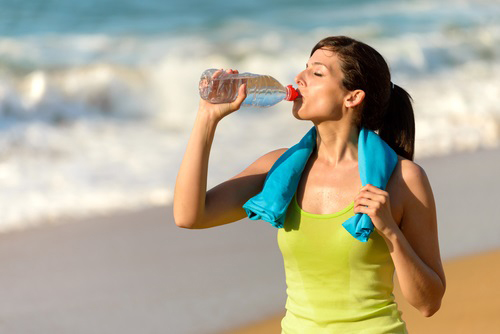
Summer Safety
In the summer, it’s great to move fitness activities from the gym to the great outdoors. There’s nothing better than biking or hiking through natural trails, running on the beach or enjoying a refreshing swim on a sweltering day. But outdoor exercising has some risks and hazards, too. Here are some precautionary tips for enjoying the outdoors safely.
Limit sun exposure.
Sunburns and tans cause damage to your skin because ultraviolet rays are a form of radiation. In addition to prematurely aging your skin, one of the biggest risks is for developing skin cancer. Anytime you are out in the sun, use sunscreen of 15 SPF or higher; water-resistant 30 SPF is recommended for extended outdoor activity. Apply 30 minutes before going out, and reapply every few hours.
Hydrate, hydrate, hydrate.
In hot weather, dehydration, heat cramps, heat exhaustion and heatstroke are all risks. Learn the signs of heat exhaustion – dizziness, nausea, weakness, cramps, headache – and take it seriously. Time your strenuous activities to early morning or early evening hours when its cooler and the strongest rays of the sun do not add to your risk of dehydration.
Don’t get bugged.
Ticks are a nuisance at the best of times but can also carry illnesses like Lyme disease. Authorities say weather conditions are producing a perfect environment for an infestation this year, particularly on the east coast. Use bug spray and wear long sleeves and pants. To minimize the risk of stings and bites from mosquitoes, bees and wasps, wear light clothing, and avoid scents and perfumes.

Consume carefully.
To avoid food poisoning, ensure foods can hold up without refrigeration. Foods with mayonnaise, dairy, or eggs can develop bacteria in only a few hours and make you quite ill. Undercooked meat, poultry and seafood can also carry harmful bacteria. Thoroughly wash fresh fruits and vegetables before consuming.
Monitor air quality.
Hot, sunny, humid weather is conducive to ozone formation and pollution, particularly in urban areas. This is harmful to people with diabetes, heart or lung conditions or respiratory diseases such as asthma, but also for those engaged in outdoor activities. Most states and weather bureaus issue air quality reports so time your outdoor aerobic activities accordingly.
When thunder roars, go indoors.
Thunderstorms can produce strong wind, hail, lightning – and in some cases, flash floods and tornadoes. Monitor weather before long hikes, runs, bike rides or beach days. In an electrical storm, get inside and away from windows. A car is also good shelter.
Get more health and wellness tips by logging in to www.theEAP.com to access your Wellness Center.
1.800.252.4555 or 1.800.225.2527
View more newsletters at www.theEAP.com
